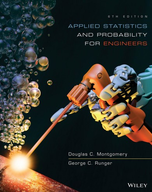Solution Found!
Consider the visits that result in leave without being
Chapter 3, Problem 136E(choose chapter or problem)
Consider the visits that result in leave without being seen (LWBS) at an emergency department in Example 2-8. Assume that people independently arrive for service at hospital l.
(a) What is the probability that the fifth visit is the first one to LWBS?
(b) What is the probability that either the fifth or sixth visit is the first one to LWBS?
(c) What is the probability that the first visit to LWBS is among the first four visits?
(d) What is the expected number of visits until the third LWBS occurs?
\(\begin{array}{|lccccr|} \hline{\text { Hospital }} \\ \hline & \mathbf{1} & \mathbf{2} & \mathbf{3} & \mathbf{4} & \text { Total } \\ \text { Total } & 5292 & 6991 & 5640 & 4329 & 22,252 \\ \text { LWBS } & 195 & 270 & 246 & 242 & 953 \\ \text { Admitted } & 1277 & 1558 & 666 & 984 & 4485 \\ \text { Not admitted } & 3820 & 5163 & 4728 & 3103 & 16,814 \\ \hline \end{array}\)
Questions & Answers
QUESTION:
Consider the visits that result in leave without being seen (LWBS) at an emergency department in Example 2-8. Assume that people independently arrive for service at hospital l.
(a) What is the probability that the fifth visit is the first one to LWBS?
(b) What is the probability that either the fifth or sixth visit is the first one to LWBS?
(c) What is the probability that the first visit to LWBS is among the first four visits?
(d) What is the expected number of visits until the third LWBS occurs?
\(\begin{array}{|lccccr|} \hline{\text { Hospital }} \\ \hline & \mathbf{1} & \mathbf{2} & \mathbf{3} & \mathbf{4} & \text { Total } \\ \text { Total } & 5292 & 6991 & 5640 & 4329 & 22,252 \\ \text { LWBS } & 195 & 270 & 246 & 242 & 953 \\ \text { Admitted } & 1277 & 1558 & 666 & 984 & 4485 \\ \text { Not admitted } & 3820 & 5163 & 4728 & 3103 & 16,814 \\ \hline \end{array}\)
ANSWER:Step 1 of 6
Probability is a fundamental concept in mathematics and statistics that deals with uncertainty and randomness. It is the study of the likelihood of events occurring, and it provides a framework for making informed decisions in uncertain situations. Probability theory is used in various fields, including mathematics, science, economics, engineering, and more.
